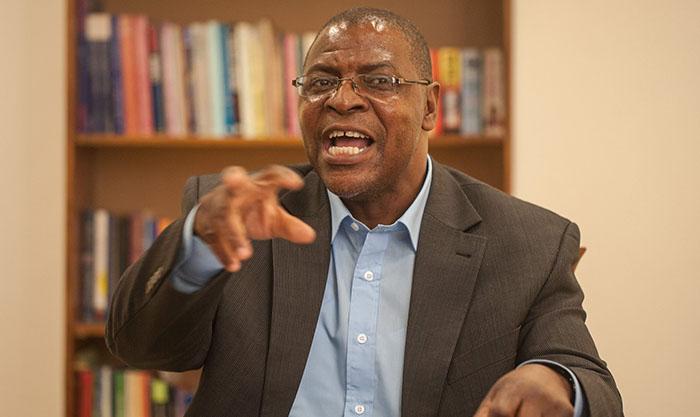News / National
Welshman Ncube apologises to Court for filing fake case citations
5 hrs ago | Views

Prominent lawyer and legal academic, Professor Welshman Ncube, has issued a public and formal apology to the Supreme Court of Zimbabwe after it was discovered that legal documents filed by his Bulawayo-based firm, Mathonsi Ncube Law Chambers, contained multiple non-existent and defective case law citations.
The apology stems from the matter of Pulserate Investments (Pvt) Ltd v Andrew Zuze and Others [SC202/25], in which Professor Ncube acted on behalf of the appellant. In the appellant's heads of argument, which Ncube personally prepared and filed, several legal precedents were cited to support various propositions. However, the first respondent's legal team flagged a number of these cases as either non-existent or unrelated to the points being argued.
In a candid and humbling letter addressed to the Supreme Court and titled "Formal Apology for Defective Case Law Citations," Professor Ncube admitted that he had relied on a researcher within his chambers to compile relevant case law, but failed to personally verify the authenticity of the citations presented to him. He revealed that the researcher had used artificial intelligence tools to generate the case law authorities, but did not cross-check whether the cases actually existed or were relevant to the legal issues at hand.
"I take full and unequivocal responsibility for these errors," Ncube wrote. "It never occurred to me that it was possible for a graduate researcher to present to me non-existent and defective case law authorities given the training we go through as lawyers, hence my negligent failure to check the authenticity of the cases."
Professor Ncube emphasized that the mistake was not intentional and was not meant to mislead the court or the opposing party. Rather, he described the incident as a "catastrophic lapse in professional judgment," adding that it was personally embarrassing as a senior counsel and officer of the court. He acknowledged that the integrity of legal proceedings depends heavily on the accuracy and truthfulness of legal authorities cited in court filings.
The flawed citations included references to several fabricated or improperly cited cases, some of which bore striking similarities to real judgments but had no record in the official law reports. Among the case names cited were matters allegedly involving Marange Resources, Zimasco, Chiroswa Minerals, and other mining firms—none of which could be substantiated in the Zimbabwe Law Reports or Supreme Court archives.
Ncube's letter of apology was directed not only to the court but also to the legal counsel for the first respondent, who had been forced to spend time and effort verifying the legitimacy of the references.
Legal analysts say this development has reignited debate over the growing use of artificial intelligence in legal research and writing. While AI tools have proven useful in many respects, the Ncube incident highlights the risks of relying on such technology without human oversight and professional verification.
The matter remains before the Supreme Court, and while no disciplinary measures have yet been announced, legal observers suggest the incident could set a precedent on the standards of due diligence expected from senior legal practitioners in the digital age.
The apology stems from the matter of Pulserate Investments (Pvt) Ltd v Andrew Zuze and Others [SC202/25], in which Professor Ncube acted on behalf of the appellant. In the appellant's heads of argument, which Ncube personally prepared and filed, several legal precedents were cited to support various propositions. However, the first respondent's legal team flagged a number of these cases as either non-existent or unrelated to the points being argued.
In a candid and humbling letter addressed to the Supreme Court and titled "Formal Apology for Defective Case Law Citations," Professor Ncube admitted that he had relied on a researcher within his chambers to compile relevant case law, but failed to personally verify the authenticity of the citations presented to him. He revealed that the researcher had used artificial intelligence tools to generate the case law authorities, but did not cross-check whether the cases actually existed or were relevant to the legal issues at hand.
"I take full and unequivocal responsibility for these errors," Ncube wrote. "It never occurred to me that it was possible for a graduate researcher to present to me non-existent and defective case law authorities given the training we go through as lawyers, hence my negligent failure to check the authenticity of the cases."
Professor Ncube emphasized that the mistake was not intentional and was not meant to mislead the court or the opposing party. Rather, he described the incident as a "catastrophic lapse in professional judgment," adding that it was personally embarrassing as a senior counsel and officer of the court. He acknowledged that the integrity of legal proceedings depends heavily on the accuracy and truthfulness of legal authorities cited in court filings.
The flawed citations included references to several fabricated or improperly cited cases, some of which bore striking similarities to real judgments but had no record in the official law reports. Among the case names cited were matters allegedly involving Marange Resources, Zimasco, Chiroswa Minerals, and other mining firms—none of which could be substantiated in the Zimbabwe Law Reports or Supreme Court archives.
Ncube's letter of apology was directed not only to the court but also to the legal counsel for the first respondent, who had been forced to spend time and effort verifying the legitimacy of the references.
Legal analysts say this development has reignited debate over the growing use of artificial intelligence in legal research and writing. While AI tools have proven useful in many respects, the Ncube incident highlights the risks of relying on such technology without human oversight and professional verification.
The matter remains before the Supreme Court, and while no disciplinary measures have yet been announced, legal observers suggest the incident could set a precedent on the standards of due diligence expected from senior legal practitioners in the digital age.
Source - byo24news























